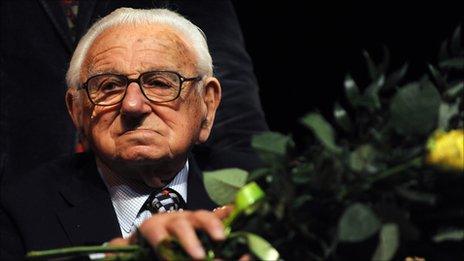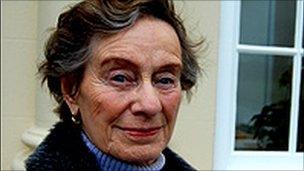'English Schindler' Sir Nicholas Winton turns 102
- Published

Sir Nicholas Winton at the premiere of a film about him, Nicky's Family, in 2010
Aged only 28, Sir Nicholas Winton helped save nearly 700 Jewish children from Nazi death camps, earning him the nickname the "English Schindler".
Thursday is his 102nd birthday, which he will be celebrating with family and friends in Maidenhead, Berkshire.
One of the children he saved, 82-year-old Vera Gissing, said of his age: "It's absolutely amazing, he's been such a fantastic figure all through his life and so caring with everyone.
"He still has such incredible wit. It's amazing and very heart-warming to still be part of his life."
She added of the birthday party: "I think he will enjoy it, and I'm sure there will be lots of people there."
Mrs Gissing, originally from Prague, was 10 when she was helped by Sir Nicholas to flee Czechoslovakia just before World War II broke out.
In June 1939, shortly before her 11th birthday, her parents arranged to get Vera and her sister, Eva, on a special train to Great Britain, organised by Sir Nicholas's Czech Kindertransport.

Vera Gissing has written two books about Sir Nicholas Winton
"Nicky Winton came to Prague by chance," she said. "He was packing to go skiing in Switzerland with a friend of his.
"Then the friend phoned him up and said 'forget skiing, come to Prague, I've got something important to show you'."
This was in November 1938, and at that time there were masses of refugees who had fled to Prague from the Sudetenland.
It was part of Czechoslovakia which had effectively been presented as a gift by British Prime Minister Neville Chamberlain to Adolf Hitler in September 1938.
It meant that Czechoslovakia was exposed to future invasions from Nazi Germany.
"There were so many people who had no clothing, no money and many children in makeshift camps," said Mrs Gissing.
"There was no one to help them."
'Think large'
When Sir Nicholas visited the camps he decided to take action.
"He could have put his hand in his pockets to give some money towards the upkeep of the children," said Mrs Gissing.
"But no, his motto was to think large. He decided there and then he would save as many young lives as possible."
Sir Nicholas was only in Prague for three weeks and had to organise the rescue in that time, including liaising with the British Home Office to organise permits for the children and finding homes for them.
"He had over 5,000 names on the list by the time he left Prague, and 669 children actually were saved," said Mrs Gissing.
Vera went to live with foster parents in Liverpool and later attended a school in Wales for Czech refugee children.
By the time she was repatriated to Prague in 1945 she knew that both her parents had perished in the Holocaust.
"But today there are about 5,000 of us who are alive thanks to him," said Mrs Gissing.
"We've had children, grandchildren and some of us even great grandchildren. What an incredible achievement."
A humble man, his story only came to light by chance 50 years later when his wife found papers relating to what had happened in a battered briefcase in his attic.
Sir Nicholas was knighted in 2002 for services to humanity.
- Published20 January 2011
- Published18 September 2010